Sarah Clarkson's Blog, page 3
August 28, 2018
We Read for Community (...and a Giveaway!)
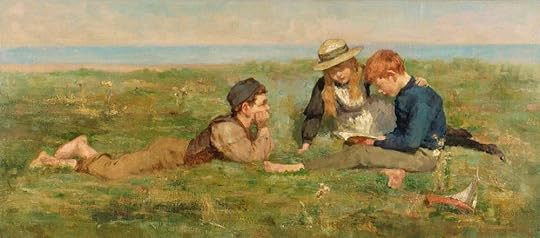
"There are no faster or firmer friendships than those formed between people who love the same books."
Irving Stone, Clarence Darrow for The Defence
I started writing this post at least half an hour ago. But my sister is in Oxford for a bit and as we sit across from each other at this battered old coffee shop table, attempting to study, we cannot resist stopping every few seconds to, you guessed it, share a little sliver of some tasty gem we've just read. She's up to her eyeballs in Charles Taylor and when she reads me a quote, I have to stop and listen with all my attention because A Secular Age tends to challenge the way you see the world. I'm reading her the bits of Hannah Coulter I quoted in Book Girl or the passage of Kant I'm just beginning to wrestle through in my study of modern doctrine. Back and forth we pass these words. As they kindle and form us, we share them, and as we savor them together, we are knit, ever closer, into our kinship as sisters, as friends, as readers.
We Clarkson sisters read, you see, for community. We read because shared words expand our worlds together, they knit us close in vision and belief, they give us a community not only of place and body, but of inward sight and hope. It's why Thomas and I read together in our marriage - novels and theology, essays we want to discuss. It's why my Mom and I discuss what books we're reading when we grab our coffee times each week in amidst work and baby and all the bustle of living. Reading is one of the great forces of friendship in our life.
Community is the third gift I hope that my Lilian, and the readers of Book Girl will discover as they foray into the reading life. To read a book is to enter a companionship of imagination; it is, first, to encounter the mind of another in the book in your hands, to have your vision of the world enlarged by fellowship with the author. But reading is also a means of connection, a way of sharing life and insight, dreams and ideas, that offers a rich and beautiful way to come close in soul to another person.
I can't say it any better than I wrote it in Book Girl, so this week I'll share an excerpt from Chapter 7, 'Books Can Foster Community' (and shall now turn to Joy who is waiting to read me another quote):
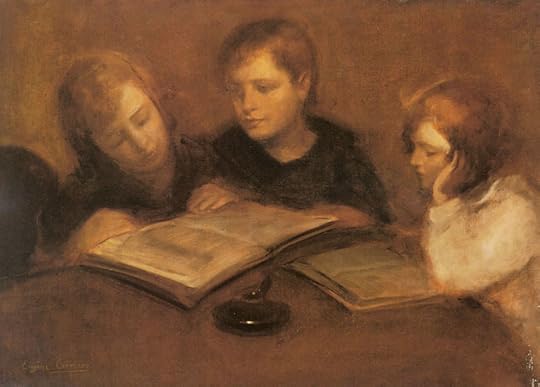
"It was the summer after I’d turned twenty, and I was perched on one of the creaky white rocking chairs on my family’s front porch in Colorado with my “little” (both over six feet) brothers beside me. In true Clarkson tradition, we’d decided to read a novel aloud during our summer at home. But we felt a little trepidatious, the scuffles of siblinghood and competition lurking at the edges of anything we did, all complicated by the newly adult selves we had become. We felt slightly strange to each other, our emerging maturity, our growing dreams the secrets that sat on the edge of our tongues too new and dear to articulate, too strong in us for ease. But we settled in bravely, cups of hot chocolate in hand, as I began the perilous tale of Peace Like a River, a book whose pastoral title belies its drama of asthmatic boys and cowboy-poet little girls, of miracles and murder.
Day after day we returned, immersed in the story, comrades in the shared space of imagination. As we voiced the vivid characters, marveled at the word craft of the author, and laughed at the fierce loves and wild creativity of the little girl, Swede, we were set in a unique camaraderie of experience that loosened our tongues, revealing us to each other. We argued over the choices of the characters, debated the bold actions of Davy, and shared the quiet of a character’s death. In those spaces we saw one another anew, discovered one another afresh, as compelling as any characters a novel ever offered. We recognized each other as unique as the book drew out our individual ideas, and yet we were connected together as the story pulled us into a shared language of experience, a shared understanding of what is right and good as imaged in the beauty of the novel’s end. In the hush of the final word, the closed cover, with the first autumn leaves in their turn on the aspens around us, we knew ourselves woven together anew, bound as friends and siblings by the power of a shared story.
I discovered afresh in that moment that a woman who reads is a woman who relates. A book girl knows that a shared book is a ground of mutual discovery, a space in which the soul and thoughts of another may open to her in a wondrous way. Just as a week’s stay with a friend can bring you closer than any number of coffee dates or run-ins, the sharing of a story accelerates the comradeship of souls. When people inhabit a realm of imagination or theology or poetry together, their own realms of soul and spirit are revealed to the others who sojourn with them in that place. Reading, when shared, begins a conversation that breaks down the barriers of isolation and connects us, one to another, as we exclaim, in C. S. Lewis’s description of friendship in his book, The Four Loves, “What! You too?”1
I sometimes wonder if the stock image of a reader is of an introvert curled up in a curtained window seat. There is definitely truth (and, I’d argue, delight) in that image, but one of the strongest impressions that comes to me when I reflect on what reading has created in my life is the image of fellowship and the widened horizon of relationship. This was a reality I first knew in my own family. Our sibling summer of reading as young adults was a chosen return to a pattern we had learned in childhood. My parents read to us morning and night, we read novels before bedtime, we read devotions in the morning, and we read picture books or adventure tales in the afternoon. The culture of our home was shaped in large part by the stories we shared, and my parents saw this as one of the formative ways in which they created a ground for us to know each other not just as siblings but as friends.
That pattern of shared story and relationship is one whose power I have experienced throughout my adult life; it is one of the rela- tional tools that my introverted self knows can always create space for friendship in whatever new place I sojourn. In my time at Oxford, I’ve watched as a poetry group started by my tutor turned a group of shy theology students into talkative friends who revealed aston- ishing things about their own lives in their comments on the lumi- nous poetry we read aloud together. I’ve watched a group of disparate students—young professionals, singles, and couples, all dogged by the hurried loneliness of the academic or working life—coalesce as a community over a shared weekly meal and read-aloud surprise in our home, each member taking a turn to bring something to read to the group. And let’s be honest, I knew that things with my husband-to-be might just work out when I saw books by Tolkien, C. S. Lewis, Peter Kreeft, and Chaim Potok on his bachelor shelves. We had been dating only two weeks when I got the chance to peek at his books. I knew it would be telling: student rooms in Oxford are so tiny, there’s room for only a few absolute favorite or necessary titles—if, of course, you are the kind of person who loves your books enough to lug them with you all over the world. And what if Thomas wasn’t? The door opened, and my eyes shot toward the shelves. There in splendid promise stood a fat volume of The Lord of the Rings, with a slim copy of Lewis wedged close by and a bevy of other familiar titles stacked beside them. I sighed in relief. He’d passed the test—on several levels. (And our two copies of The Lord of the Rings, one in Dutch and one in English, now have pride of place on our living room bookshelves.)"
...continued in Book Girl!
May you discover the force that a shared story can be in the formation of friendship, in the knitting together of family, in the comfort of knowing that books help you to know you are never alone.
AND NOW FOR THE GIVEAWAY... I am delighted to be giving away one copy of Book Girl to a commenter today. Comment on the post below with the title of your current favorite book, to be entered in a giveaway. Thanks for reading and engaging my friends!Launch week is just a few days away. Keep an eye here and on my Instagram (@sarahwanders) in the next days as we're doing some really marvelous giveaways (I really can't wait to announce them) and fun book girl community projects.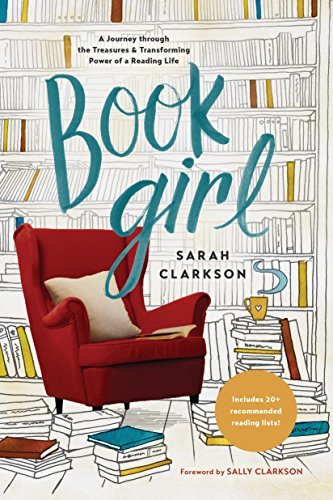
We Read for Community

"There are no faster or firmer friendships than those formed between people who love the same books."
Irving Stone, Clarence Darrow for The Defence
I started writing this post at least half an hour ago. But my sister is in Oxford for a bit and as we sit across from each other at this battered old coffee shop table, attempting to study, we cannot resist stopping every few seconds to, you guessed it, share a little sliver of some tasty gem we've just read. She's up to her eyeballs in Charles Taylor and when she reads me a quote, I have to stop and listen with all my attention because A Secular Age tends to challenge the way you see the world. I'm reading her the bits of Hannah Coulter I quoted in Book Girl or the passage of Kant I'm just beginning to wrestle through in my study of modern doctrine. Back and forth we pass these words. As they kindle and form us, we share them, and as we savor them together, we are knit, ever closer, into our kinship as sisters, as friends, as readers.
We Clarkson sisters read, you see, for community. We read because shared words expand our worlds together, they knit us close in vision and belief, they give us a community not only of place and body, but of inward sight and hope. It's why Thomas and I read together in our marriage - novels and theology, essays we want to discuss. It's why my Mom and I discuss what books we're reading when we grab our coffee times each week in amidst work and baby and all the bustle of living. Reading is one of the great forces of friendship in our life.
Community is the third gift I hope that my Lilian, and the readers of Book Girl will discover as they foray into the reading life. To read a book is to enter a companionship of imagination; it is, first, to encounter the mind of another in the book in your hands, to have your vision of the world enlarged by fellowship with the author. But reading is also a means of connection, a way of sharing life and insight, dreams and ideas, that offers a rich and beautiful way to come close in soul to another person.
I can't say it any better than I wrote it in Book Girl, so this week I'll share an excerpt from Chapter 7, 'Books Can Foster Community' (and shall now turn to Joy who is waiting to read me another quote):

"It was the summer after I’d turned twenty, and I was perched on one of the creaky white rocking chairs on my family’s front porch in Colorado with my “little” (both over six feet) brothers beside me. In true Clarkson tradition, we’d decided to read a novel aloud during our summer at home. But we felt a little trepidatious, the scuffles of siblinghood and competition lurking at the edges of anything we did, all complicated by the newly adult selves we had become. We felt slightly strange to each other, our emerging maturity, our growing dreams the secrets that sat on the edge of our tongues too new and dear to articulate, too strong in us for ease. But we settled in bravely, cups of hot chocolate in hand, as I began the perilous tale of Peace Like a River, a book whose pastoral title belies its drama of asthmatic boys and cowboy-poet little girls, of miracles and murder.
Day after day we returned, immersed in the story, comrades in the shared space of imagination. As we voiced the vivid characters, marveled at the word craft of the author, and laughed at the fierce loves and wild creativity of the little girl, Swede, we were set in a unique camaraderie of experience that loosened our tongues, revealing us to each other. We argued over the choices of the characters, debated the bold actions of Davy, and shared the quiet of a character’s death. In those spaces we saw one another anew, discovered one another afresh, as compelling as any characters a novel ever offered. We recognized each other as unique as the book drew out our individual ideas, and yet we were connected together as the story pulled us into a shared language of experience, a shared understanding of what is right and good as imaged in the beauty of the novel’s end. In the hush of the final word, the closed cover, with the first autumn leaves in their turn on the aspens around us, we knew ourselves woven together anew, bound as friends and siblings by the power of a shared story.
I discovered afresh in that moment that a woman who reads is a woman who relates. A book girl knows that a shared book is a ground of mutual discovery, a space in which the soul and thoughts of another may open to her in a wondrous way. Just as a week’s stay with a friend can bring you closer than any number of coffee dates or run-ins, the sharing of a story accelerates the comradeship of souls. When people inhabit a realm of imagination or theology or poetry together, their own realms of soul and spirit are revealed to the others who sojourn with them in that place. Reading, when shared, begins a conversation that breaks down the barriers of isolation and connects us, one to another, as we exclaim, in C. S. Lewis’s description of friendship in his book, The Four Loves, “What! You too?”1
I sometimes wonder if the stock image of a reader is of an introvert curled up in a curtained window seat. There is definitely truth (and, I’d argue, delight) in that image, but one of the strongest impressions that comes to me when I reflect on what reading has created in my life is the image of fellowship and the widened horizon of relationship. This was a reality I first knew in my own family. Our sibling summer of reading as young adults was a chosen return to a pattern we had learned in childhood. My parents read to us morning and night, we read novels before bedtime, we read devotions in the morning, and we read picture books or adventure tales in the afternoon. The culture of our home was shaped in large part by the stories we shared, and my parents saw this as one of the formative ways in which they created a ground for us to know each other not just as siblings but as friends.
That pattern of shared story and relationship is one whose power I have experienced throughout my adult life; it is one of the rela- tional tools that my introverted self knows can always create space for friendship in whatever new place I sojourn. In my time at Oxford, I’ve watched as a poetry group started by my tutor turned a group of shy theology students into talkative friends who revealed aston- ishing things about their own lives in their comments on the lumi- nous poetry we read aloud together. I’ve watched a group of disparate students—young professionals, singles, and couples, all dogged by the hurried loneliness of the academic or working life—coalesce as a community over a shared weekly meal and read-aloud surprise in our home, each member taking a turn to bring something to read to the group. And let’s be honest, I knew that things with my husband-to-be might just work out when I saw books by Tolkien, C. S. Lewis, Peter Kreeft, and Chaim Potok on his bachelor shelves. We had been dating only two weeks when I got the chance to peek at his books. I knew it would be telling: student rooms in Oxford are so tiny, there’s room for only a few absolute favorite or necessary titles—if, of course, you are the kind of person who loves your books enough to lug them with you all over the world. And what if Thomas wasn’t? The door opened, and my eyes shot toward the shelves. There in splendid promise stood a fat volume of The Lord of the Rings, with a slim copy of Lewis wedged close by and a bevy of other familiar titles stacked beside them. I sighed in relief. He’d passed the test—on several levels. (And our two copies of The Lord of the Rings, one in Dutch and one in English, now have pride of place on our living room bookshelves.)"
...continued in Book Girl!
May you discover the force that a shared story can be in the formation of friendship, in the knitting together of family, in the comfort of knowing that books help you to know you are never alone.
Also. Launch Day is just about a week away! Now the fun really begins. Starting this week, we will be announcing giveaways, contests, and fun. On Instagram I'll be sharing little reviews and book excerpts every day, and I'll be doing podcasts and interviews here and there. Follow me on Instagram or Facebook to join in the fun. Happy reading, lovelies.

August 22, 2018
We Read for Courage
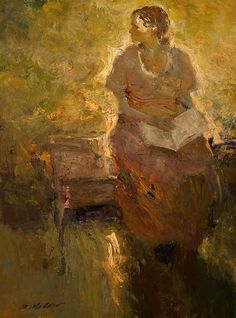
The theatre was dark, the music in the kind of slow, lyrical build that draws your heart into your aching throat, as I watched the story of Snape, one of the most troublesome characters in the Harry Potter series, come to its climax. My siblings and I had joined hundreds of others that evening to catch the midnight showing, delighted to witness the film closing to a story that had taken me, at least, by real surprise with its profoundly explored themes of friendship and power and sacrificial love. Of course, I'd read the books first and came to the movie with the scenes already vivid in my imagination, but I wasn't prepared for the poignancy with which the filmmakers crafted the moment of revelation that comes to Harry as he confronts the hidden sacrifice and grief and bravery of Snape's frustrated life and finds that it shows him how to love more sacrificially than he has ever imagined he could.
When I did, I found myself weeping. More startling though, was my realisation that the grown man beside me (a stranger) was also crying, sobbing uncontrollably, shoulders shaking with silent, chest-deep heaves, tears running unchecked down his stubbly face. I might have found this extremely uncomfortable if my sister beside me wasn't also crying, as were most of the other people in my line of sight in that old theatre. I saw faces of total, honest sadness, of yearning, or radiant hope all around me.
I sat there in wonder, awed at the way this shared story broke down the polite facades we all usually fix carefully in place and somehow allowed each of us to touch something grieved and yearning in our own hearts. I sat there amazed at how deeply this story of an unloveable but oh so brave character got to the depths of some truth that defines us, that illuminates our own struggle. And when I got home that night, I lay in bed trying to understand exactly what it was the story had given us. I came to two conclusions.
First, I think Snape, the flawed character, helps us to glimpse and accept our own imperfect reality. We see ourselves in his flawed and resentful heart wrestling with his desire to be faithful in the one love he has experienced. Glimpsing his story helped each of us in that theatre (each reader of the books, of course!) to acknowledge a little of the tragedy we carry in our own hearts. I think we were all, in a way, peering inside our own hearts in that moment of revelation, at our own yearning and frustration, our own desire for love, our own capacity for evil. I know I was thinking of all the hard things I had known recently, of my struggle to trust God, my sense of feeling unseen and unloved and the bitterness I felt growing within me. The story helped us to speak ourselves true.
But second, in Snape, I think we also saw what I think is once of the most powerful concepts we gain by exposure to great stories, and that is the possibility of agency, the knowledge that we as characters in our own story have the capacity to choose to act upon love, to fight for goodness, rather than to give in to the darkness of our own hearts or the meanness of our circumstances. Later in the series, Harry, who has spent most of his life hating Snape, names his own little son after the man and tells the child that Snape was 'the bravest man I have ever known'. Because it is Snape's act of sacrifice that helps Harry to choose the brave act on which the whole story turns.
In Snape, I think we, with Harry, glimpse both the depths of our frailty and the heights of our capacity to be redeemed by, to act in, love. In that final novel of what is truly a masterful series, in the glimpse of Snape's courage, Rowling's many readers gained an idea of what it means to live in courage, to act in brave, loving defiance of the darkness, and that is a gift I think we need pretty much daily in this dark, hurting old world. We are all of us fighting a battle and we read for the courage to act, hope, and love in our own small stories.
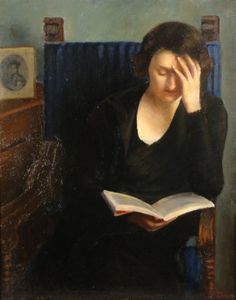
When I wrote my Book Girl introduction with Lilian in mind, I knew that one of the keenest gifts I wanted to give her through books was courage to face a world that I know she will all-too quickly discover to be broken. I wanted to gird her with strength to confront her own frailty, her fear, to face bad dreams when she's tiny and failed dreams when she's older with a fighter's heart. I wanted to equip her to wrestle well with the sly, hurtful ways of the world, and more, with the discovery of those ways in her own heart. I wanted her to know that though she might suffer grief or loss or disappointment, that she might be tempted and she might do wrong, those are not her identity, because she has the capacity, always, to act, create, confess, forgive, and oh, always, to love.
In a chapter titled 'Books Can Impart Hope' (in Book Girl) I write about some of my own deep grief, and the way that stories have helped me to live with courage:
"A reading woman is a realist; she lives in this broken place, and she grapples with the daily stuff of life in a fallen world. Broken bodies, shattered relationships, a world in which wars and flat tires and miscarriages are daily realities—this is her story, and the great works of fiction and theology show her what redemption looks like in ordinary time. I find it ironic that the reading of novels is sometimes criticized as an escapist activity, because some of the novels I love best are the ones that have taught me how to accept and survive the most grievous facts of my life. It was Alan Paton’s Cry, the Beloved Country that first made me honest enough to admit the way personal pain made me doubt God’s goodness or the way grief made ordinary life feel pointless. But it was that same book that showed me the possibility of a creative, stubborn faith that could endure even in total tragedy." (p. 222)
The books that have helped me to that the most? Well, Harry Potter of course. But also...
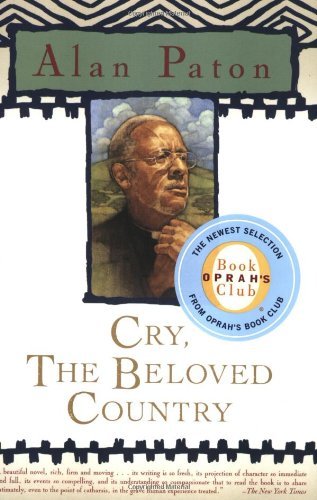
Cry the Beloved Country by Alan Paton, one of the more poignant and searing explorations of loss I have ever encountered while also managing to be a novel about a man who rejects the poison of bitterness. I love this quiet story of a father's love in the midst of apartheid in South Africa.
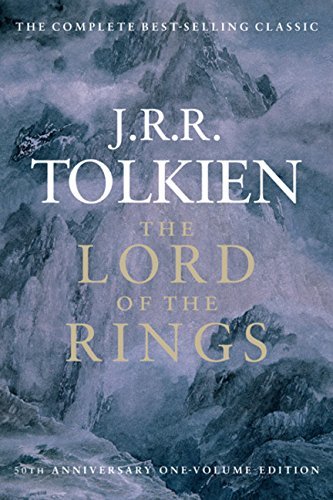
The Lord of the Rings has always been one of the spiritual touchpoints of my reading life, a novel that invaded some of the darkest moments of my teens with the message that beauty endures, that hope allows me to act in courage, that I had a choice to make and a good battle to fight.
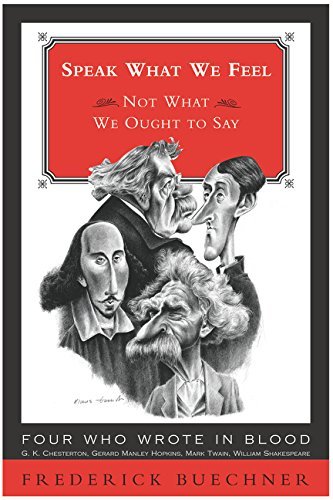
Frederick Buechner's work has also always been a deep encouragement to me, one that looks unblinkingly at the darkness of the world yet tells me I can be led in and through it by the light of love transforming even the shadows. His 'Speak What We Feel and Not What We Ought to Say' is a marvelous look at works of literature like Huckleberry Finn, The Man Who Was Thursday, and Shakespeare's King Lear, all forged in faithful courage in the midst of suffering. And his memoir, 'The Sacred Journey' is an aching beauty of a book.
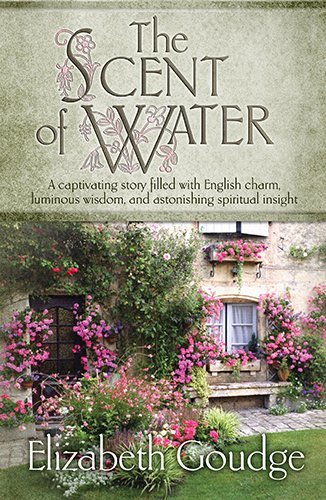
Finally, Elizabeth Goudge's The Scent of Water is a contemplative story, a novel of the interior world exploring what it looks like to be faithful - in prayer, in willing to live - amidst mental illness and loneliness. I return to this novel again and again for strength and courage to walk and strive well in my own journey.
These stories walked with me as brave companions who challenged my tendency to despair or inaction, who showed me by their narratives that love is a choice we can make, that courage is a story we can live, one whose horizons open all of our lives up to the light of hope.
For as Madeleine L'Engle so poignantly put it:
A book too, can be a star, a living fire to lighten the darkness...
August 14, 2018
We Read For Beauty
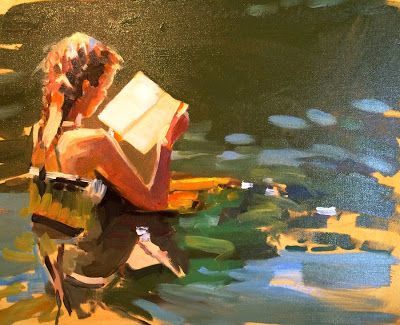
When I sat down to write the introduction to Book Girl, I remember curling up on my couch in the rain light of a broodingly gray autumn day, soaking in the quiet, searching my mind for the words to encapsulate exactly what it was I wanted to give my readers in this 'book on books'. I was pregnant with my Lilian, just beginning to feel the otherworldly, precious tumble of her movement inside of me and my mind keep wandering toward her in thought, toward the books I wanted to read with her, the goodness I so deeply wanted to pass on. I realized, in a moment of epiphany, that the things I so longed to give to her in the reading life, and to my readers in Book Girl, were the same. They boiled down, when I finally started scratching them out, to three wishes that I described as follows:
"The reading life is like one of those potent graces bestowed by fairy godmothers on princesses in old fairy tales, the sort to help a young heroine grow in all good things, to love life in its fullness and beauty, but also to make her strong in resisting the forces of evil stepmothers or wicked fairies already gathered round her cradle... I firmly believe that books will help my daughter come into the full strength of her womanhood in all its intelligence and joy, its capacity and grace—and I’m firmly convinced they’ll do the same for you. The gifts of reading boil down quite quickly to three basic wishes, bright as any in a fairy story. They are the wishes, the hopes that ache in my heart as I read aloud to my little girl, the ones that echo back to me from my mother and shape my prayers for you as this book begins.
I want your heart to be stocked with beauty.
I want you to be strong for the battle.
I want you to know you're not alone."
In three posts over the next few weeks, I want to say a bit more about each of those wishes and share a brief list of the books that have most nurtured those qualities in my own life, books you'll find explored in more depth in Book Girl.
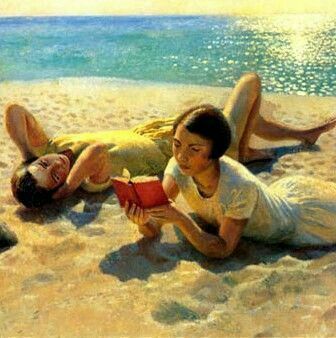
First, beauty. Oh friends, we so often start in the middle of the story when we talk about why we should read; for education or morality or compassion. These are true and right reasons, practical and necessary. But these have to do with actions, with shaping how we work in the world and I think the first reason we read its to shape our very essence, to form the selves from which we act. We read first, to shape the person inside, to outfit the inner landscape of imagination and expectation from which we look out upon the world, and that is a world in great need of beauty.
What do I mean by beauty? I mean a bone-deep knowledge of the goodness of the world; the heaven-crammed splendor of creation, the gift of a mystery that is every other human soul we meet, the possibility of redemption, of friendship and laughter, the reality of grace invading every corner of existence. By beauty, I mean an encounter with God 'at play' (in Gerard Manley Hopkin's terms) in the world he created for joy and is redeeming in love.
If we are to wrestle well with the pervasive realities of our fallenness and frailty, we need to have some sense that our origin was good, that we were meant for wholeness and love. We need to know that our story was meant to be one of health, and I believe that books helps us to glimpse this powerful reality. Great stories form us by showing us the way that love works as a creative power in the fallen world, drawing us to renewed creation.
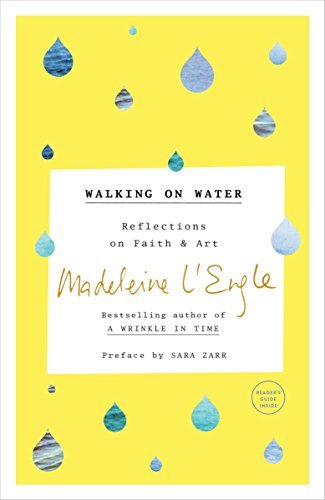
In reading, for me, that has meant my perennial return to the works of Madeleine L'Engle, especially her essays. In works like Walking on Water or the Crosswicks journals or The Genesis Trilogy I have drawn strength and vision from her affirmation of God as a lover and a father, a Creator who crafted a rich and joyous world, whose voice still echoes in starsong and baby's laughter. When I think of her books, I think of imaginative spaces in which I am able to 'taste and see' the goodness of God in her celebration of the cosmos in its loveliness, in her way of seeing the interconnectedness of people and place.
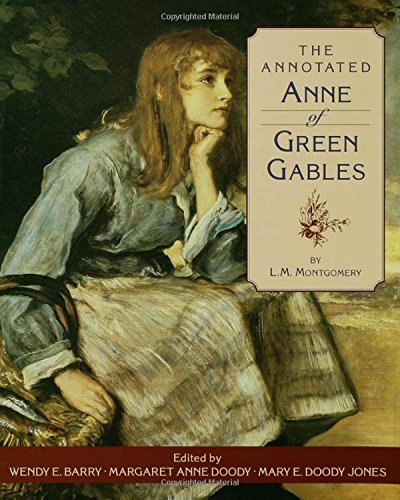
A conscious knowledge of beauty as a force came to me also and early in the Anne of Green Gables books. The older I get the more I marvel at the way Anne teaches her readers to see the world; her vision is almost sacramental, one that recognises the divine imagination speaking to us in apple trees and wind, the laughter of friends and the daily dance of sunset and starlight.
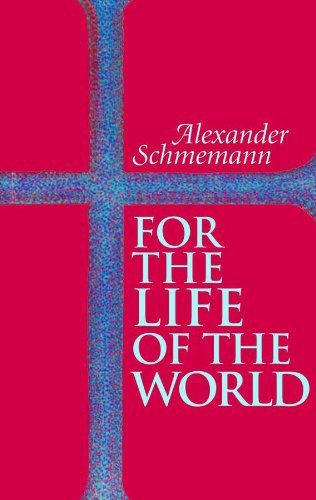
More recently, I've revelled in the theology of Alexander Schmemann, who insists upon a right understanding of the gift of creation as central to our grasp of who Christ is and what he works. I love his quote here: "All that exists is God’s gift to man, and it all exists to make God known to man, to make man’s life communion with God. It is divine love made food."
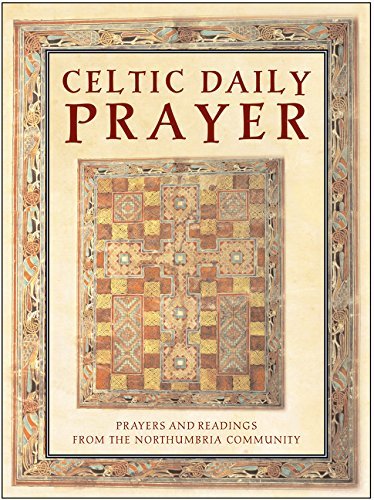
And I find it daily in the liturgy I say in Celtic Daily Prayer, the prayer book formed by the Northumbria Community. One of the opening lines in morning prayer is taken from Psalm 16, the request to 'dwell in the house of the Lord all the days of my life, to behold the beauty of the Lord...' Those words frame in my existence morning by morning; they help me to think of my time as the space where I meet God, the realm in which I may daily encounter his reality in the full strength of his goodness.
Does reading for beauty mean I don't read books that speak of fallenness and despair? Of course not. I read books where beauty blossoms up in the darkness as hope. I read stories about people who are flawed and fallen, but who can choose for hope or change, for forgiveness or creativity so that I may become aware of those capacities in myself. I read stories acknowledging the difficult, disappointing world, that then show me what it means to take up the dust of it all in my hands and form something new.
We read for beauty precisely because we are broken and we need to remember that we can be healed.
And that is the first wish I have for my readers when they delve into Book Girl.
“A book, too, can be a star, a living fire to lighten the darkness, leading out into the expanding universe.”
-Madeleine L'Engle
Pre-order Book Girl now!

Book Girl: A Journey through the Treasures and Transforming Power of a Reading Life
By Sarah Clarkson
August 9, 2018
A Book Girl's Manifesto (and the Book Girl pre-order bonus is here!)
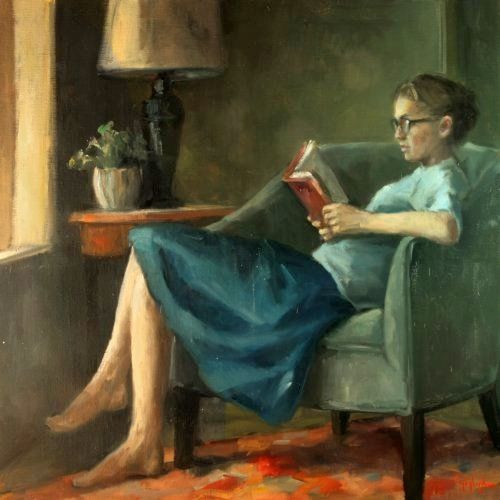
I'm on my second cup of coffee because I got up early to write this post and slipped out of the house right after Lilian fell back asleep. I've been sitting here, with music that reminds me of thunderstorms and roadtrips and great adventures humming in my ears (think Celtic soundscape) and I intended to write an informative, essayish first post in a series of posts about why I wrote Book Girl. But the music and the coffee and the cool early morning was too much and I ended up just breathing out a Book Girl Manifesto, a spoken-word style list of the ultimate reasons I think we ought to read. I'll start the post series next week, exploring some of the themes of the poem below in depth - we'll look at reading for beauty, for courage, and for connection (and I'll explore a few of the books that illuminated those qualities for me). For the moment though, I hope a little of the verve and grace of what I feel in thinking of the reading life comes to you in reading my little morning creation (is it a poem? A song? A mini-essay?) below.
But before I leave you to that, I'm really delighted to announce that the publisher and I have crafted a delightful little package of extra book lists and printable, illustrated quotes for those who have pre-ordered Book Girl. It's such delight to watch this book of my soul make its foray into the world. I can't thank you enough for the way you are creating a way for it, joining the excitement by pre-ordering the book. This bonus is a small way of saying thanks. GO HERE to fill out the form and get the download.
And now, friends, have a joyous day, a day livened by words that bring you alive to the richness of life, the hope that is always drawing us forward, the love glimmering at heart of our existence.
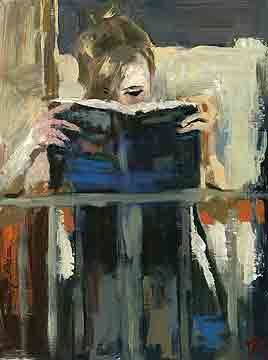
A Book Girl's Manifesto
We read to live.
We read to have hearts stocked and staid by the beauty of God.
We read because it is our way to reach out and grasp the world in its splendor.
Words give us a thousand questing hands by which we can taste and touch
The goodness of the first Creator who spoke this story of a world alive
We revel in the words that teach us that berries are ruby and succulent,
That show us the earth as a treasure ‘crammed with heaven’,
We read to rejoice in the works of imagination, story and poem,
That liven us to glimpse God’s own imagination at work in the laughter of wind,
The solemnity of trees, the endless wild landscape of a best friend’s heart.
We read, my friends, for woven in the words of great old stories is holy sight
Words are open windows looking out on the world we glimpsed in Eden
And lost,
And yet have been homesick for in every quiet minute of our lives
We read to remember the goodness in which we were made,
The beauty that still invades our days with grace, and makes our lives
A journey home.
We read for hope.
We read so that we may defy the darkness,
We read to start the stories running once again,
And look on sorrow and the countless broken hearts we bear and grieve
And know for an instant that pain never has to be our end
That Love was a life and a story lived among us,
A living Word that showed us how to turn the page and renew the horizons.
Whose own lived story began ours afresh.
We learn this in every great story we read
We witness the way that a bold, brave character
Can fling the way open to hope,
And so we know, that we too are living stories
And the pen lies in our grasp, the word of new creation is ours for the writing,
The acting, the reading,
And our end is not grief, but glory.
We read for connection.
We read so that we may reach out and comprehend
The soul of another,
Discover that the meaning we yearn to find,
The hunger for beauty that defines our lives,
Is shared, can become, when offered, the space of a deep communion.
We read so that we can see the ‘other’, the person who is not us
And yet to whose soul we are bound in Love
We read to glimpse the world that is another human mind
We read to glimpse the face of God reflected in the eyes
Of the spouse we barely understand, the child we study in the discipline of love,
The friend whose way of seeing is an endless startlement, a graced surprise.
We read to remember that we cannot, by nature,
Exist in isolation, for we are living beings spoken into living story
By the breath of God, the living Word,
Whose name is Love,
The author who tells us whole and knits us together.
We read to remember that we are never alone.
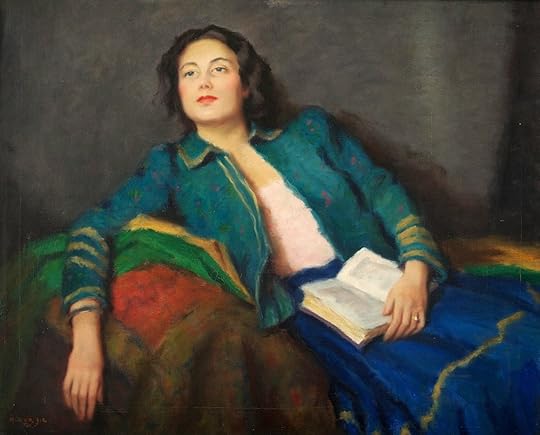
July 20, 2018
God Where I Don't Expect Him

This moment: late sun flying low in the sapphire sky, shedding light like gold rain that soaks the air and seeps in through the open window as I lie all jetlagged and sleepy on the couch.
Peonies on the table, just three in an old glass bottle, faces arcing toward the light.
Picture books piled on the floor, a trove of gems culled from a visit back west.
Quiet that feels like gift and burden all at the same time, no deadline or schedule, no place-to-be hurry reaching into this moment to drain its rest but a sense of restlessness at its back.
And her: baby weight resting full on my chest as I lie on the couch in the gold dust hush of a day that was hot and now has been healed by shadow. Her breath in its quick, infant rise and fall, the fragile rhythm I so often check, afraid that the music might cease. Her hands in their sleepy curl, their questing, tired grasp of my finger. Her head, nestled in under my chin, pushed up, up, up, always closer, as if she would shape my body to her curled little self once more.
This baby, my gift, the shifter of my whole self, the darling tyrant over my time. This baby, in whose presence I am relearning God's presence and my own way of being in the world, a shift in sight I feared before it happened.
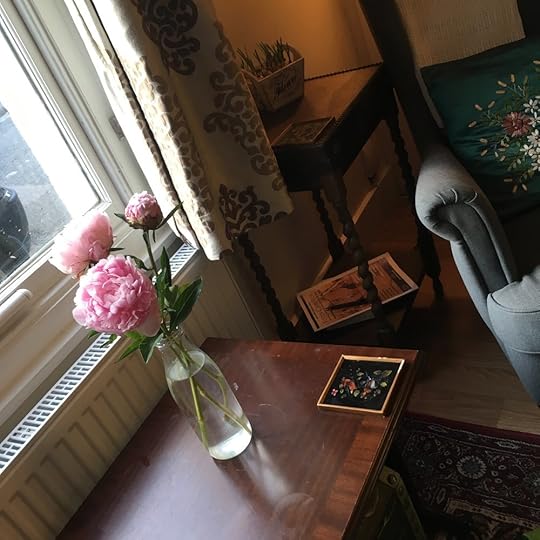
In the early days of my pregnancy with Lilian, I wrestled with a hearty dose of anxiety. This unremitting back-of-my-psyche feeling that something was wrong and that I wouldn't be able to manage what was coming. I'm learning that its part of the hormonal process for me, but the hormones just magnify whatever fear is actually there. I feared injury or catastrophe (for us both). I feared death. I fretted about the challenge of raising a child in the modern world. I feared change - in my marriage, my time, my vision of the future. But do you know one of the things I feared most?
Mundanity. Repetition. Countless days with no horizon beyond baby care.
I wasn't afraid of the work, I was afraid of meaninglessness. I'm a dreamy idealist at home in books and big ideas. I love beauty, I'm restless for adventure. I do keep my house as tight a ship as I can, but laundry isn't my favorite and it's a work of disciplined will to clean my bathroom. Funny as it may sound, the prospect of days mired in diapers, baths, feeding, and sitting at home with a little person who couldn't talk left me profoundly anxious that I would become dry in soul and restless in spirit.
I told this to a mentor of mine here and he smiled. Hmm, he said. I wonder if what you're really fearing is that you will lose the presence of God. I thought that was a bit of a leap, but I listened as he explained. We all have a way we are used to finding God, he said, a certain rhythm of being, an emotional or mental state we seek by habit that helps us to come to a place of peace or prayer, centredness or calm. If, like you (he said), by nature usually find joy in the transcendent - in movement and travel, in big ideas and long times of reading and huge swathes of silence - the prospect of a life in which those activities are severely curbed can make you feel that you’ll lose your way to comfort or hope, to God.
I’ve contemplated this often in the months since Lilian’s birth because I've realized its largely true. Early morning quiet times have been a basic rhythm of my life for most of my adult life. And those are simply not happening in this season. There just isn't time for long swathes of reading (the way I've always known to bring my soul to centre and health) or profound journaling more than once every week or two. And in my more exhausted moments, I have felt a little panicky. How can I find God? How will I keep hold of hope, or the bigger picture of love and holiness which is, after all, what I'm hoping to raise Lilian to love?
But in the midst of this new whirlwind I've sought again and agin to act upon the words of my mentor. Because after identifying the fear, he set me a challenge; to rediscover God in the places I don't expect to find him. He reframed my fear as an invitation to discover that God is not bounded to just the places I have found him before. He truly is the Spirit who sings and whispers in every corner of our existence. My mentor, that day, gave me a few ways to focus on the present, to draw my attention, my hunger for comfort or hope, into the present by focusing on a single detail - Lilian's eyes, the color of the sky, the rhythm of our breath as it seems to mingle when I hold her to my heart when she falls asleep. What I am discovering, what, let us be honest, I am learning to discover when I choose to slow down and see is that Lilian's presence is an invitation into a kind and depth of loving I couldn't imagine before I encountered the utter trust of this baby.
I struggle greatly with it at times. The immediacy of baby care is a shocking sweetness but also the kind of all-encompassing work that swallows whole days before you know you've blinked. Feeding follows napping follows changing follows playing follows rocking-a-baby-who-wrestles-with-sleep... to sleep. And ten minutes after you've sat down, it all begins over again. I get so weary, as all new mothers do.
But my wrestle has been to keep my mind from disengaging and instead to draw my full attention into the minute miracles of Lilian and her burgeoning life. In them, I am beginning to understand a little more of the way that God views me, celebrates and delights in the smallest attention I give him, the growth I manage despite my immaturity.
I watch this blue-eyed baby whose gaze follows mine with a loving intensity whose match I've never quite met (unless it was in those early days of falling in love with Thomas) and I realize how precious the gaze of a child is to a parent. How precious mine is to God. I watch the minute changes of growth and development in Lilian (she can point her tongue! she ate her foot! she rolled over!) that come to me like revelations and I understand how precious my slow growth is to my own Father. I learn about the capacity we have for love, an almost terrifying depth. My love for Lilian seems oceanic, cosmic, suffusing my whole being, but it is only an echo, a radiant glint of the love God bears for every single one of us.
In Lilian, in this tiny person who summons me by her need and trust into this moment, this place, this person, I am discovering the God who lurks and shimmers, waiting to surprise us with his own extravagantly-given presence, his own mother-like attention to our need and hunger, our frailty, our budding affection. Truly, he cradles us as I cradle Lilian, he is present to me as I am to her.
And the gift of love that is this child o' mine just keeps on growing. Even amidst the mundane details I dreaded. In fact, they are becoming a gift...
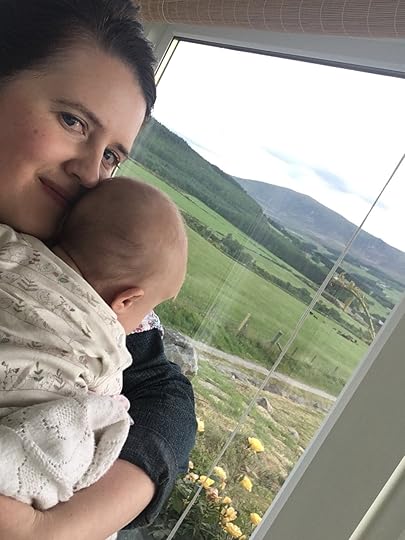
May 30, 2018
News (A book, a talk, & photos)
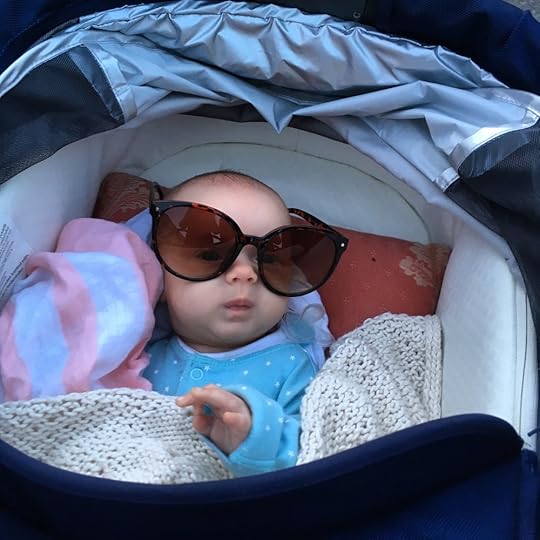
I couldn't resist...
In my world at the moment, the headline news of any day is Lilian's waking smile. That girl. Oh my goodness. I am mesmerised by the emerging personality of this tiny person. I had no idea (for some reason) that a 12-week old baby could be this vibrant of a little soul. This girl o' mine charms me with her whole-body grins, her gurgled conversations, her intense, blue-eyed stare (I like to think she has my eyes because otherwise everyone says she looks like Thomas). I'm slightly besotted in the healthiest possible way.
Lilian is sleeping at the moment, however, and I am itching to get back to writing here so I'm snatching this dusky, rain-lit afternoon minute to get back in the saddle and say hello to you friends with a few points of enjoyable news.
First, I'm tickled to let you know that Book Girl is now available for pre-order at Amazon and other outlets. I'm so eager to launch this book on its journey into the reading world. It's a heart of my heart book. I wrote and rewrote the essays, combed the book lists, restructured the whole thing after I submitted the first draft. I wrestled with this manuscript, laboured with it really, because it was a message, a story rooted in some of the best gifts of love I've known, the truest wisdom I've found. It's finally ready. I think I'll be able to share a few tastes of it soon, so keep an eye here for a snippet or two in the next few months. And if you, as so many other lovely readers have done, wish to join the launch team, drop me an email through the contact form and I'll add you to the list.

Second, I take a slightly starry-eyed delight in letting you know that I'll be giving a talk on Tolkien and theodicy at the Wycliffe Summer School here in Oxford in June. It's my first time to present on any aspect of my theological work and oh my. I'm excited. You'll be hearing more about what I've been working on in the whole arena of theodicy (i.e., the problem of evil when God is so good) anyway as I think I'm finally beginning to have space to write about it more creatively. I have some questions to ask you all and thoughts to test. But here's a video about the conference for now, just for fun.
Third, on a slightly less auspicious note, but no less enjoyable to me, the curious amongst you will find that I have finally fleshed out my Photography page. It's nothing fancy and I'm not professional. But I've glimpsed so much beauty in my past traveling years and I think one of the gifts we can give each other in this life is a continual reminder of how very good life can be - in snatched, luminescent moments - because that beauty teaches us to hope toward the healed world that's coming. I've uploaded several galleries from some of my favourite adventures, and you'll find that I've added a suggested soundtrack to accompany each set of images. Because I like to think that there's a sort of soundtrack to life. More coming soon. Enjoy.
For now, the bird's are chirruping their evening song and the rainy day is drawing down to the darkling hour and I want to take Lilian for a quick stroll before dusk sets in. So I'll bid you farewell for the moment.
But I'll be writing here again soon...
May 14, 2018
To Sally, the Valiant and Beloved
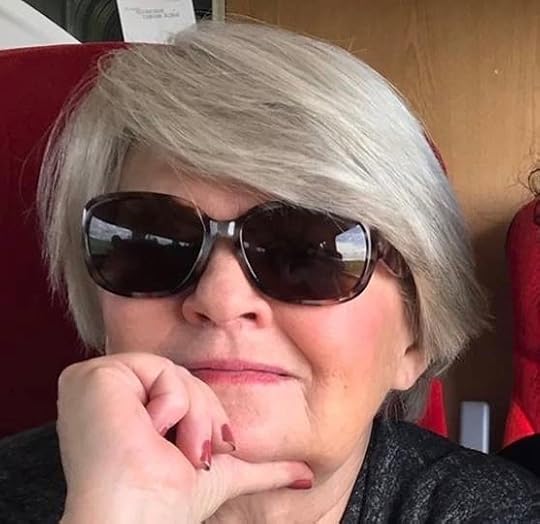
Two months ago, after first making a huge move to England to be with me and help me through Lilian's early days, having also just seen me through Lilian's adventurous, snow-bestormed birth and the stressful early days of nursing, my mom catastrophically injured her eye. She randomly tripped one evening and fell straight on her eye, landing with her full weight on the sharp corner of a table. The injury was severe; a deep cut, a corneal ulcer, and a raging infection within days. Since her injury, my mom has lost most of the sight in her right eye, endured almost constant, throbbing pain, countless early morning trips to a London eye hospital, round the clock eyedrops that meant weeks of almost no sleep, and a total inability to read, write, work, or for awhile, even watch a movie.
You might think that such an avalanche of trial might get her down. Not my mom. I have watched her wrestle through her exhaustion every day, still strolling down to bring me a scone and make me a cup of tea and delight in Lilian's smiles. I've watched her gamely buy sunglasses to wear indoors while determined to keep on cooking us meals and enjoy holding her grandbaby. I've watched her rock back and forth in pain while still managing to keep up a conversation, to laugh, to tell us to light the candles and get the music going. I've watched her struggle toward joy in moments of deep discouragement by remembering Scripture, by opening the windows to the Oxford spring air, by listening to music one more time. Her prognosis is unclear. But not her courage; it's clear and radiant as a diamond. She hopes. She loves. She trusts God to be good.
My mama is a marvel. I wish I could write a more eloquent tribute, but at the moment, I have a baby sleeping in my lap (only place she'd settle today) and I'm typing this with one hand because I dare not move and wake the little (darling) terror. I wrote the piece below years ago, so it will have to do for now. The courage and generosity I glimpsed in my mom in those early days of childhood has become an image of what I hope I will be able to give to Lilian in the years to come.
Here's to you, sweet Mom.
Dear Mom,I have a story to tell. Perhaps you’ll think it an odd one for a tribute to your motherhood. A workaday tale it may be, but in my mind it is a bright, unfading gem. For what you gave me one Texas morning almost twenty years ago remains a grace that forms the bedrock of my heart. Memories don’t get much better than that, odd or not. Here goes.
I stood with munchkin nose pressed hard against the back door glass. Outside, the skies tumbled and fought, the rain fell in torrents for the fifth day, and the roar of newborn creeks called me even through the panes. Behind me, you gathered books and pencils for a morning of school work, switching on the lamps to battle the outdoor gloom. But even as you did, the boys slipped beside me, glued their noses to the window too and when you called we turned three small, grieved faces away from a world that seemed tailor made for splashing and exploration.
“Aww Mom,” we groaned, timid but yearning for that alluring realm beyond, “can’t we just go outside and explore today?”
I still remember my startlement at your “yes.” The way you were silent for a second, took a deep breath, pushed the books aside, and put your hands on your hips.
“Old shoes and old clothes on before you go,” you ordered and we hastened for our gear, grabbing boots and jackets, hearts pattering in elation at this wholly unexpected day. We were back in two minutes, and behold, so were you. A tiny jolt touched my heart at sight of you decked in scuffed shoes and old jeans, intent upon joining our expedition. I hadn’t expected that; the Queen would lead the adventure, a queen who would also wash the several loads of muddy clothes resulting, mop up our bootprints on the kitchen floor, and defend our bedraggled state to my grandmother when we returned. But I was too little to know all of that. All I knew was that your presence hallowed the adventure. And ah, there was so much we longed to show you.
Out we tromped into a world all a-whisper, the air tingling with rain, the sky swift and changeful as the rivulets below. In an ecstasy of abandon we jumped in every puddle to be had within the first ten feet, twirled and whooped and ran all out, limbs loose and swinging, to the pasture gate that led to the flooded tank. There the real drama awaited, a real flood down by the giant oak, now up to his waist in new-made rivers.
“Come on Mom!” we screeched above the roar of the water, picking our way through the mud of the old cattle-trails, ducking beneath cedar branches and wintered vines. You came. Smiling, eyebrows arched in interest at every fossil we pointed out, every yell of false-alarm when a branch turned out not to be a snake. You came right into the streams, splashed us with the cold, swift water, and when we eyed the swiftest torrent with daring, hungry eyes, you nodded your permission. In we went, right up to our short little waists, fighting against the current in an overjoyed grapple with the one joyous fact of the water.
I remember that for one instant I looked back at you. Already in the current, I turned and sought your face. I was a little in awe that you would let us dare the flood. I was proud that you were there to see us do it. And if I was also a little afraid of the torrent, well, I had you at my back. You caught my eye. And to this day I cannot forget the glint of fun that blazed in your glance. Then the slight nod of reassurance that told me I would never be out of your sight. Then the smile, like a whisper between those who know the great camaraderie of adventure. I laughed. And dove straight in.
And that Mom, is one of the clarion moments for which I will thank you all my days.
For in that instant you gave me your own heroic view of life. I know now that courage was always your mark. You were a dreamer; lover of the underdog, a missionary in communist Poland, a writer, a teacher, daring in faith and fierce in friendship. And even when three squirmy children invaded your life, you kept that courage strong. You brought it right into your motherhood and determined that we should learn it too. That rainy day adventure was a lesson in valor, in gladness, in dreams. You wanted your children to taste the haunting grace of the world, so you freed us to heed the cry of the rain. You knew that danger is always close, so you came too. You knew that life is full of risk, so when we met the dare of the water, you let us hope, and reach, and try, and you taught us the boldness with which this thing called life must be met.
Only now, grown up as I am with the demons of oughts and shoulds ever breathing down my neck do I understand the import of the choice you made that morning. You could have said no. You could have resolutely shut that door, glared down our yearning little hearts, rebuked our impractical imaginations. You could have insisted on an ordinary day and a checklist of chores. But you saw that our hearts were ripe for the forming. You saw that holy hunger for far horizons, you saw our need to try, to dare, to reach for something just beyond our grasp. So you opened the door. Be bold, said your eyes, be joyous. Be brave with my blessing.
But you also gave us yourself. Your presence was the strength at our back, your laughter the song that sent us leaping through the rain. You stood there on the creek bank, eagle-eyed, cheerful, strong, and the sight of you glimpsed through the splash and rain sent a courage like blood pulsing through our veins. We tried all the harder because you were there. We dared because we knew you would await us at the end. And when we tromped home, gloriously wet and utterly exhausted, it was you who sat us by the fire, brewed the cocoa, and lingered with us in the flickering light. Your interest made us heroes. We told of the current that nearly got us, the branch that nearly broke, the newest fossil found, and it was your admiring words that turned us into knights at battle’s end, triumphant and ready to fight again.
To know that life is a great quest is one thing. To be given the love to meet it is another altogether. You, my precious mother, gave us both.
Courage in living and love that does not fail – these themes defined my childhood. That one bright day was a note in a larger song. When life was dark, you lit candles. When times were grim, you made a feast (even if it was only homemade bread and cheese). When the battle I faced was doubt of God, you looked me in the eye and said “He’s bigger than your doubts.” But then you took my hand; “don’t worry, I’ll have faith for you until yours lives again.” When sickness came, when friendships failed, you challenged me to write, to love, to hope with every fibre of my being. When Oxford seemed a dream beyond all grasping, you said “just try.” And when once there, I thought for sure my essays would be flops, you ordered me to take a good long walk, drink tea, and “give it one more go.”
Meet the battle and face it with a song. Light a candle and lay a feast in the very teeth of darkness. Dare, always, to try once more. To love again. That’s what you taught me.
So here’s to you beloved and valiant mother o’ my heart. You make me think of Tennyson’s line in Ulysses, “we are, one equal temper of heroic hearts.” To have shared your heart and learned your courage is a gift that will follow me all my days. I hope I learn to be as brave as you.
Happy Mother’s Day.
Love,
Sarah
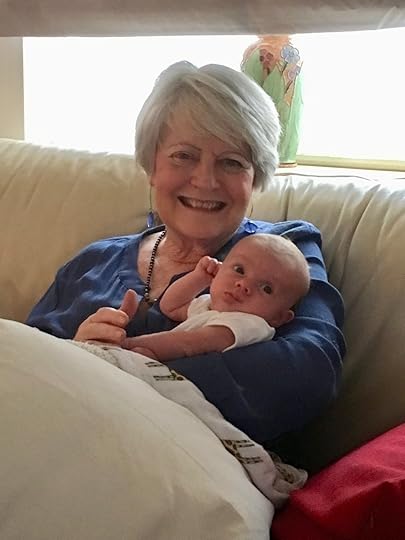
April 12, 2018
The Coming of Lilian

'Twas a dark and stormy night (oh but really, it was) when Lilian Joy made her sweet way into the world.
The 'beast from the East', a rare springtime snowstorm, had howled its arrival through the Oxford streets early that morning and had not subsided in the least by the time a full moon lit the fitful, storm-scudded skies. Having announced her coming by sending me into 44 hours of building early labor (an arduous process I coped with by embarking upon a long-awaited marathon of watching the Harry Potter films), Lilian upped the ante in the wee smas of the 2nd of March. My water broke, the pains tripled, and I suddenly found I only thought I'd been brave until then. The real work began, the drama of which sent Thomas, my mom, and me scurrying for the hospital. Our little lovely was on her way and coming fast.
A saint of a neighbor and very dear friend was willingly dragged from his bed to drive us through the gusty streets. Thomas had to clear the road at least once (the rest is a bit hazy to me), but we made it to the hospital through blowing snow. We quickly found though that the cozy, midwife-led maternity unit we'd planned to use for the birth was closed. My only, desperate prayer was for a room with a birthing pool. By God's sweet grace, the only room on that floor with a pool had just come free and I stumbled in as a midwife arrived and began to prepare for the birth. The maternity wing was in an uproar due to absent staff and rearranged teams struggling to cope with the complications of the storm. Our poor midwife was on her third 12-hour shift, but by the time we arrived, there wasn't much time to talk or wait and we all buckled in for the birth.
In my mind, the labour from that point was swift, though I think it was at least another two hours. They gave me gas and air (it's just like on Call the Midwife!) which helped me to gain the upper hand I needed over the pain. The warm water made a world in which I could work as I entered the 'zone' I'd been told I'd find. The pushing seemed to take forever and a blink of the eye at the same time. I remember Thomas' quiet, unshakeable presence, holding me, willing me to the strength I needed. I remember my mom's unceasing encouragement as her own baby gave birth and she cheered me on through every pain, squeezed my hand when I thought I couldn't push any more. I remember my own concentration, the total giving of my body to the work of bringing my daughter into the world with a might I had never mustered before. I remember wondering if it would ever end, and... out she came, suddenly, sweetly, a little fish the midwife told me to catch.

I caught that silky-skinned little baby and held her close and saw two things at once. Her eyes, like midnight skies in their navy, newborn light. And her hands; expressive and delicate, already dancing around her face in a grace that still startles and amuses me. And I felt this quiet, exhausted thanks as this new little heart beat next to mine.
It still beats next to mine as I write here, a warm bundle of sleeping baby propped between my arms as I write. My lovely Lilian is now six weeks old. She's tiny, but growing quickly, my delicate little baby with her contemplative gaze, her expressive hands, her sensitive spirit, and solemn eyes.
Several people have asked me in recent days, 'what's it like to be a parent?'
I think it's the most world-altering thing I've yet known, and at the same time the most normal thing I've ever experienced. Love makes itself at home, and I think that's what is at work here as the fact of Lilian shapes us to itself. We are, in a way, reborn in the grace of her presence, our own lives reshaped to receive her. I find I can barely leave her for a few minutes without wanting to see her again, watch her, check that she flourishes (and breathes!), bask in the sheer wild wonder of her little person. Of course, I get a lot less sleep. I feel that I never have more than a few minutes to do anything. Autonomy is a thing of the past (as is carefree coffee shop runs). Sometimes she cries for whole hours at a time and I wish one of us was in another world altogether!
But I did not know what a pervasive, quiet devotion would suffuse the whole of my being for my daughter. I'm surprised at the gentle, unadorned tenacity of it. It's not the adoration of puppy dog cuteness (though that is certainly present). It's not a frilly or sentimental emotion. Rather it's almost like pain in its inexorable presence, a current of knowledge that throbs beneath everything else I do, tinging the whole of my life, except that its love. And so it's joy, a strange exultation in what I feel as this calm, radiant assent to the strength of love that has been born in me with the coming of my daughter. To be her mother expands and defines my identity forever.
That's what I know on this rainy Oxford afternoon as I write again for the first time after the coming of Lilian Joy. The story of her coming, the birth of this love in my own heart and in the form of my baby is the first story I have to tell, my thanks to the God who is, himself, love.
And now, I'd better leave you because those tiny eyelids are fluttering. Little Lily's about to awake...

February 14, 2018
A 40-day Novel

The above picture looks fairly serene, no?
The circumstances surrounding it were anything but. That was taken far too early on a frosty morning after workmen showed up at my door three hours early to fix our boiler and thus resupply us with hot water (which had been absent for quite some time). My hands were so covered in coconut oil (because, you know, I've read all the right, strongly-opinionated natural books about it keeping pregnant skin supple) that I actually couldn't turn the handle of the door and had to wrap my hands in a scarf to let them in. I then grabbed every piece of fruit I could see in the kitchen before they moved in for the rest of the morning, knowing that low blood sugar and I don't mix well. I then sat down on the couch, to catch the little breath I have these days, check that I actually was decent when I answered the door, and... I was so tickled at it all I took a photo to commemorate the moment.
Lest you ever think that life in Oxford is an idyllic round of books and teacups...
Friends, I am a book-making, baby-growing whirlwind over here. I'm in the final editing days for Book Girl (which I am radiantly excited to share with you before the year is out), finishing another few chapters for the book my mom and sister are writing together on friendship, and all the while this little bean has grown into what feels more like a cute, muscular little watermelon... that sometimes allows me to breathe. I'm counting the days to her arrival, stocking up on the absolute necessities (as well as the absolutely adorable but not quite so necessary baby clothes - they are so irresistibly cute), and trying to finish these projects before this little darling of mine arrives.
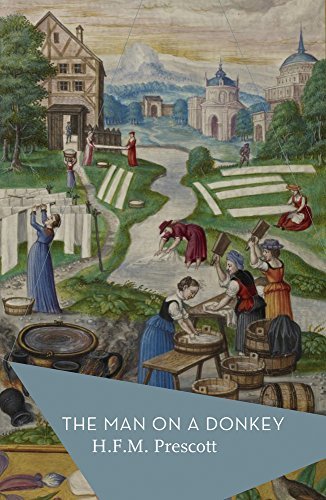
The Man on a Donkey
By H F M Prescott
Between the book-writing and baby preparation, I haven't had a spare moment to write here, and I'm so sorry. But I do have a splendid historical novel to recommend to you and a glowing essay on it written by the priest from my Anglican church. He has very kindly given me permission to share the essay here, and I'm delighted that you get to glimpse his insight. The book is The Man on the Donkey, and its rather a marvel of a story, one both historically fascinating (set in the days of Henry the VIII), but shot through with a quiet spiritual power. I've been savoring a little each day, because its the kind of book you need to allow yourself to read slowly, richly. I'll dispense with describing it for you as Fr. Jonathan does that well. But I have to add that within days of receiving it as a gift from one scholar and priest friend, I was told by my tutor at Wycliffe that it is her favorite book, and then Fr. Jonathan basically recommended that the whole parish read it during Lent, to prepare our collective hearts for Easter. How could I resist such a novel?
I'll let Fr. Jonathan say the rest:
“God is here comen to us. That is the news!”A good companion for Lent, by Fr Jonathan BeswickSo whispers the woman mystic, Malle, whose visions witness to the shimmering theological thread that runs steadfastly through HFM Prescott’s book The Man on a Donkey. “God is here comen to us. That is the news!” is her response to the seemingly more urgent and immediate political news of the autumn of 1536, running like wildfire through the north country: namely, that the people are rising up in protest at the destructive enormities of Henry VIII. It is a remarkable telling of the story of the Pilgrimage of Grace, drawing on and freely quoting from a wealth of primary sources. It is also a book that offers much food for thought for the modern Christian reader, as we are confronted, page by page, with our own family history. The title is derived from one of Malle’s visions, in which Christ is crossing the bridge over a local river, riding on a donkey.
In an introductory note Prescott usefully defines the chronicle form of her writing: it is, she says, “an attempt to introduce the reader into a world, rather than at first present him with a narrative.” And herein lies the key to Prescott’s genius: the very nature of her writing is, in itself, a setting forth of a quintessentially English theological method. It is pastoral, nuanced, humane and moderate. It requires patience and frustrates the hasty. The reader “learns….without knowing that he learns.” It is no great dogmatic system, nor one that admits rigorist legal definitions: rather, she invites us into a gently bucolic schoolroom and makes of us apprentices in the tragic story of the Pilgrimage of Grace. Her descriptive powers, for me, rival those of George Eliot and Thomas Hardy. She paints with great skill and beauty the contours of the English landscape and does likewise with the contours of the English heart.
As we enter the world of The Man on a Donkey we find ourselves being steeped in the complex political, social and religious world of 1530s England. Prescott handles the tensions of this time with remarkable even-handedness, tenderly opening-up the rival loyalties at work within the principal players. Then, in the midst of the many tangled webs of intrigue and cloistered worldly-ambition, we are suddenly encountered by the Christ himself. It is almost exactly the central chapter of the book, and I suspect this is no accident. Immediately I twice reread the chapter in question, with a mixture of disbelief and excitement.
In this chapter it is late-March and the men have been working in the fields at Marrick Priory (the soon-to-be-suppressed religious house around which much of the story revolves). They come in to the kitchen for refreshment and there is a man (in fact it is the Man of the title of the book) with them who is yet unknown: “black, shaggy-haired” and “of not much more than thirty by his look, but with lines bitten into his face by hunger, or sorrow, or by some stress beyond the common lot.” The worldly Prioress is watching proceedings, disapprovingly, from her window and describes him as “an ugly vagabond knave”, wondering if he is a shepherd from over the hill where “folk are very poor and wild.” Malle and her simple friend Wat (the unloved, bastard son of the local parish priest) recognize and follow “the Man” with their hearts bursting for joy, and there follows a Gospel-like scene of them together on the hillside: at once bleak, pre-Springtime Yorkshire and yet also unseasonably “golden harvest weather” where the ears of corn are full.
It is in this central, mystical moment that Prescott reveals the full depth of her own faith and theological understanding. It is absolutely enthralling. The Chalcedonian definition is deftly untangled for the reader in the simplest, homeliest prose: “For God, that was too great to be holden even of everywhere and forever, had bound Himself into the narrow room of here and now. He that was in all things had, for pity, prisoned Himself in flesh and in simple bread. He that thought winds, waters and stars, had made of Himself a dying man.” She later develops the theme: “And it wasn’t that He put on man like a jacket to take off at night, or to bathe or to play. But man He was, as man is man, the Maker made Himself the made; God was un-Godded by His own hand.” On several occasions Malle is put under some pressure to allow a political purpose or meaning to be attached to her visions: she won’t permit it and simply replies with the haunting refrain: “There was a great wind of light blowing and sore pain.” What more is there to say?
The Man on a Donkey was first published, in two volumes, in 1952. It was republished in 2016, in a single-volume paperback. It is 700 pages long and, at two and a quarter inches thick, presents quite a logistical challenge when trying to fit it into a shoulder-bag (I had to cut my copy in half, in order to squeeze it into my panniers for a recent pilgrimage to Assisi).
It is a marvellous read, with an enlightening introduction by John Cooper (a former parishioner of St Barnabas) of York University. It is both deeply moving and encouraging and it has caused me to reconsider some of my own dormant assumptions about the turbulence and destruction of the early 16th Century. I suppose I would describe it as a very Christian work-discreetly apologetic in the most accessible way. Eamon Duffy describes it as a “largely forgotten masterpiece”, Hilary Mantel as “a classic of historical fiction” (which, I feel, rather misses the point-but then I have to confess to being a dissenter on the subject of Wolf Hall…) and the only attributed reference I could find was in an essay by Rowan Williams, in the Oxford Handbook of Christology. Which is really where it belongs: a great work of English pastoral Christology that, at 18 pages a day, would be the perfect companion for your Lenten journey.



